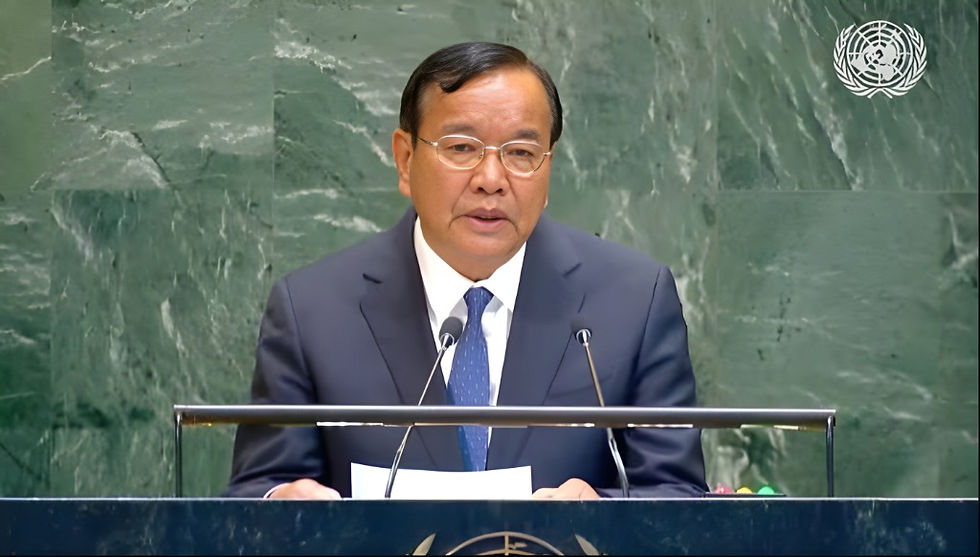Cambodia-Thailand: Phnom Penh alerts the UN to the fragility of the ceasefire
- Editorial team

- Sep 29, 2025
- 3 min read
In New York, on the occasion of the 80th session of the United Nations General Assembly, Cambodia's Deputy Prime Minister and Minister of Foreign Affairs, H.E. Prak Sokhonn, expressed his country's gratitude for the international mediation that led to the recent ceasefire with Thailand. While welcoming the initiative facilitated in particular by the good offices of the United States, he warned that this truce remained precarious and could crumble if confidence was not consolidated by concrete action on the ground.

A still shaky peace
In his speech on September 27, the head of Cambodian diplomacy stressed the ‘fragile and delicate’ nature of the ceasefire agreed after several weeks of border tension. In his view, the commitments made by both sides would not be enough without scrupulous respect for the agreed mechanisms and international treaties governing the border.
‘Sincerity can only be measured by actions,’ he said, pointing out that unilateral moves by Bangkok to impose its territorial sovereignty, backed up by the use of disputed maps and military means, were undermining efforts to restore confidence.
The thorny issue of evictions
The Minister also denounced the mass expulsions of Cambodian civilians who have been living for decades in the disputed border areas. According to Phnom Penh, these forced displacements contravene not only the terms of the ceasefire but also the bilateral agreements reached previously to settle the dispute peacefully. It sees this as a serious infringement of Cambodia's sovereignty and a violation of the fundamental rights of the local population.
Restraint shown despite the incidents
Prak Sokhonn stressed that Phnom Penh continued to scrupulously respect the truce: "Our armed forces did not resort to any retaliation, even after unprovoked attacks near sensitive sites. We have shown the utmost restraint, favouring peace and transparency in the application of the ceasefire conditions.
This attitude is in keeping with the spirit of national reconciliation that made it possible to turn the page on the civil war in the 1990s. Cambodia is calling today, as it did in the past, for a peaceful settlement of disputes through dialogue and diplomacy.
Call for multilateral support
Faced with these continuing tensions, Cambodia is urging the international community to maintain its commitment. In particular, Phnom Penh is seeking the support of the current chairman of ASEAN, the member states of the regional organisation, the UN secretary-general and the major powers. The aim is to defuse tensions, prevent a resumption of clashes and encourage the emergence of a lasting climate of trust along the border.
"We are a small country, focused on economic reconstruction and the well-being of our people. We are not threatening the sovereignty of any neighbour", the Minister was keen to point out. However, he made it clear that Cambodia would remain firm in defending its independence and territorial integrity, while favouring dialogue and cooperation.
More than just a border issue
The conflict between Phnom Penh and Bangkok is not limited to territorial rivalry. As a number of experts have pointed out, control of the border areas involves major economic stakes: control of agricultural land, exploitation of natural resources and securing regional trade routes.
According to the ISEAS-Yusof Ishak Institute in Singapore and recent analyses by the International Crisis Group, border disputes in South-East Asia, when not managed by solid international or bilateral procedures, tend to escalate through the use of force and fuel nationalism. The precedent of the Preah Vihear temple, a UNESCO World Heritage site and the scene of armed clashes between 2008 and 2011, is still fresh in everyone's memory.
Towards a ‘zone of peace and friendship’?
Prak Sokhonn emphasised Cambodia's desire to move beyond the logic of conflict to imagine cross-border cooperation that would benefit both countries. He spoke of the prospect of transforming these disputed areas into spaces of ‘peace, friendship and shared prosperity’, echoing certain initiatives already tried out elsewhere in ASEAN, notably between Thailand and Laos.
But to achieve this optimistic scenario, the current truce needs to be consolidated and bilateral commitments need to be translated into concrete action on the ground. The ball is now in the hands of political dialogue and regional and international mediation.
In a context marked by global geopolitical tensions, the Cambodian-Thai dispute embodies a persistent reality: the fragility of border balances in Southeast Asia and the ever-renewed need for cooperation mechanisms to avoid military escalation.







Comments